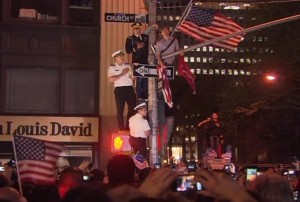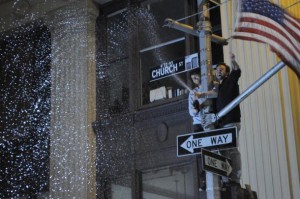 Last night, around a quarter to twelve, I was in my apartment two blocks south of Ground Zero, listening to President Obama announce the death by force of Osama bin Laden. After the live stream from the White House ended, I put on a jacket and walked up along Church Street to the northeast corner of the construction site.
Last night, around a quarter to twelve, I was in my apartment two blocks south of Ground Zero, listening to President Obama announce the death by force of Osama bin Laden. After the live stream from the White House ended, I put on a jacket and walked up along Church Street to the northeast corner of the construction site.
There was already a crowd gathering by the time I arrived, doing the sorts of things you’d expect -- waving flags, singing patriotic songs. They chanted “U-S-A!” and passing cars sounded their horns in time. The first television cameras were already there before midnight, and a news crew interviewed a man who’d wrapped himself in an American flag.
Soon people were arriving at the corner in bursts -- each time a subway came in at Chambers Street station, the crowd swelled -- and the police were redirecting traffic. Looking across the crowd, between every few heads there was a camera snapping a picture. A wide variety of flags sprang up -- one with thirteen stars; one with the face of Marilyn Monroe superimposed over it; one somewhat inexplicable Irish flag, which bobbed around near the gates of the site. Somebody threw a roll of toilet paper over a streetlamp, and a long strip of it blew in the wind, creating a different sort of a flag. From deep in the crowd a shofar rose up occasionally, bellowing. Meanwhile, new chants were appearing. The most popular one was “Fuck Osama.” A woman near me was shouting: “Dead. Dead. He’s fucking dead. America the Beautiful.”
This crowd was disproportionately comprised of young people, mostly in their twenties. As I stood there it occurred to me that these were people who’d spent their youth in a version of America defined by 9/11, an event that had eviscerated the country’s sense of impregnability. But it was the older members of the crowd who seemed to be invested in the drama of the event, some crying, some wordlessly screaming. Instead, the younger generation -- for reference, that’s my generation -- was climbing the streetlamps to spray champagne over the crowd, or hi-fiving and drinking forties, as though at a frat party.
A man in a jacket with a homemade NYPD patch sold miniature American flags for ten dollars each. A man running into the crowd, drunk, screamed, “You fuck with us, we’re gonna shit on you.” A kid in a Mets T-shirt spat, at no one in particular, “Fucking Hajji.” I did not see anyone in the crowd who appeared to be of Arab descent.
And in the middle of the fray, I kept feeling my attention drawn to the half-built tower that stands on the site of the onetime World Trade Center. I wanted, badly, to feel the energy of that moment, and to celebrate an historic occasion. I’d ought to be excited that a person who was in the business of killing the people of my country was no longer in the world. But there was something incredibly vulgar about the spirit of that moment, in which no one was without a camera and a cell phone -- for a lot of the crowd, it seemed to be just an excuse to party, and I couldn’t shake the fact that we were doing it in the shadow of a mass murder.
We weren’t alone, of course. This morning, the Huffington Post published a story on students’ reactions to the killing, which included this description of events at Penn State:
Amid chants of "U-S-A! U-S-A!" and renditions of "God Bless America" and "Proud to be an American," students burned their notes for Monday's finals, strew toilet paper in the trees, set off fireworks, crowd surfed and ran through the crowd with American flags. One girl even starting [sic] doing cheerleading stunts and unbuttoned her shirt in front of the crowd.
 I left before long. As I walked home, a group of young people stopped a couple on the street to ask them if they knew of any bars in the area. “We’re looking, too,” the man said, and the girl laughed.
I left before long. As I walked home, a group of young people stopped a couple on the street to ask them if they knew of any bars in the area. “We’re looking, too,” the man said, and the girl laughed.
Later, my roommate and I went up to the roof of our apartment building, which overlooks the construction site. The crowd’s noise floated across that negative space with its cranes and skeletons of half-finished buildings. From a distance, the voices blended together into a sort of ghostly scream which echoed down the streets of the Financial District. “It’s about fear,” my roommate said.
For my part, I couldn’t stop thinking about bin Laden. What was it about the death of this individual human being that had brought everyone out that night, including myself? We weren’t celebrating the end of Al-Qaeda, and we clearly weren’t celebrating the end of the war. Osama bin Laden was a single human being who’d been camped out somewhere in Pakistan for a number of years; his ability to hurt the United States personally was extremely limited, as a matter of fact. And his assassination was the sort of event which could be counted on to agitate extremists.
But I can remember, too, the way things were on September 11th, 2001, when I was in the seventh grade. We watched the news in class; we watched the first tower burn and the second plane hit. We saw people coming out of the high windows, flying. We’d never seen anything like it before, nor imagined that it was even possible. I remember watching a teacher watch the television without blinking; he muttered to himself, never once looking away, even when the school bell rang and we all filed out. When we left the school, all of our parents were standing in a mass in the parking lot, waiting to receive us -- they ran up, calling our names, needing to see our faces. Things were going to be different and we all knew it.
In that one sense, the phrase “War on Terror” is completely accurate. Along with the rational, credible threats that are sometimes posed to America by extremist groups, we’ve been fighting against that sense of shattered security. Bin Laden’s crime was mass murder, but it was also the act of ending our ability to feel stable or safe. My generation has grown up without that sense of security, and bin Laden, by his actions, has ceased to be a person for us, becoming instead the ever-present symbol of that instability. Now that he is dead, it’s hard to know how to feel. We want to celebrate the fact that he's gone -- we want to claim victory, to feel that relief. And in the case of those at Ground Zero last night, some feel a clear urge to party.